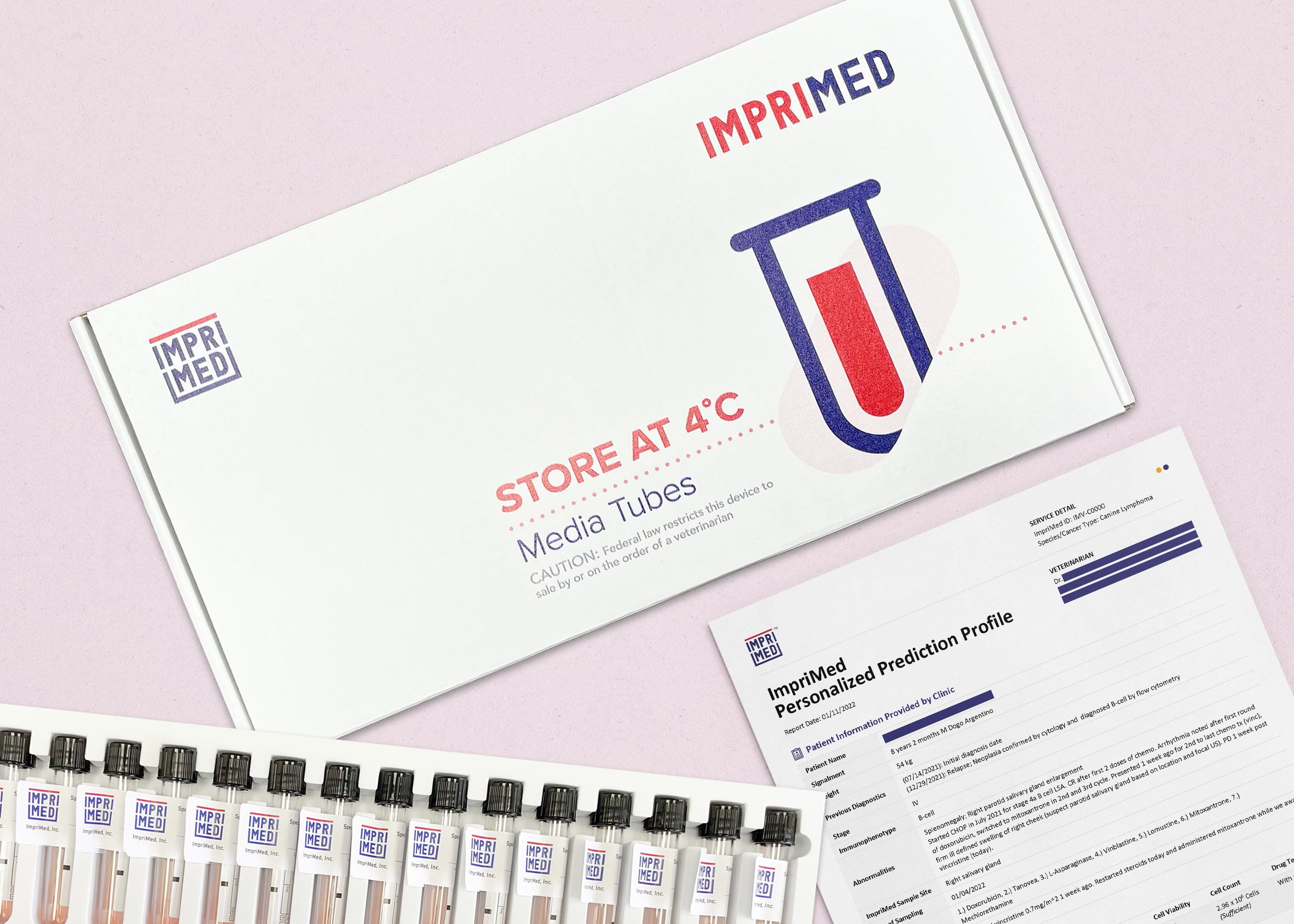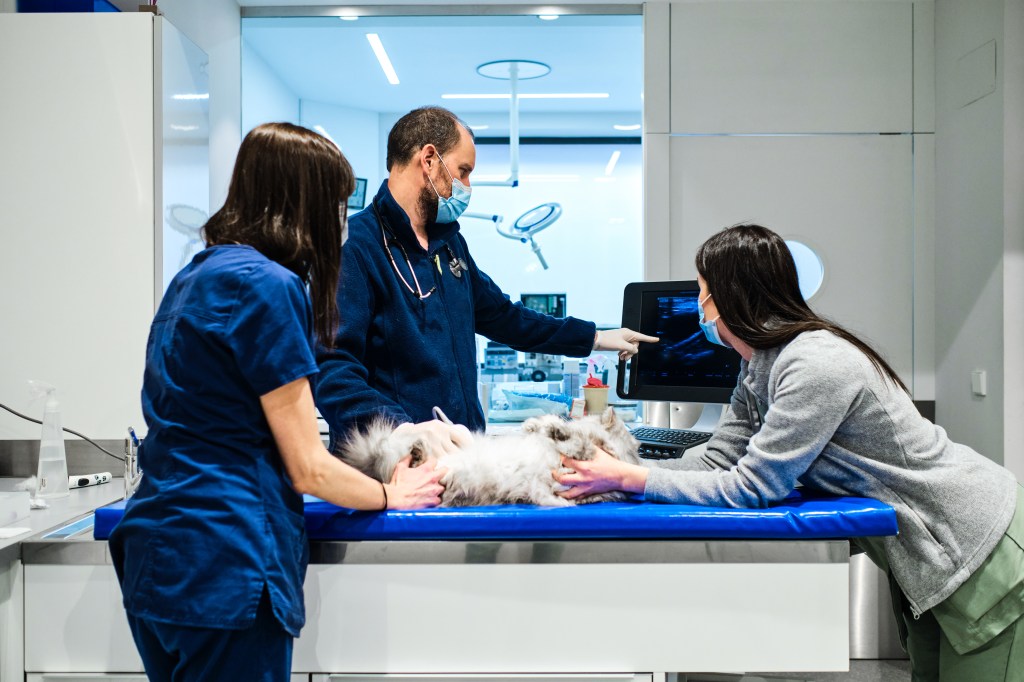ImpriMed, a California-based precision medicine startup, builds AI-powered dog cancer treatment technology that helps veterinarians identify the most suitable drugs for individual canine and feline blood cancers.
The startup, which centers on improving treatment outcomes of dogs and cats with cancer first, now aims to expand its precision medicine technology for human oncology applications.
“The ex-vivo live-cell technologies we developed for canine blood cancers are well-applied to the majority of types of human blood cancer as well as feline blood cancers,” co-founder and chief executive officer Sungwon Lim said in an interview with TechCrunch. “Also, the proven know-how acquired from developing AI algorithms in veterinary oncology streamlines the building of new predictive models in human oncology. The veterinary-to-human expansion is happening now at ImpriMed and will result in commercialization in one-two years.”
Lim, who previously worked in the cancer drug industry for more than a decade, co-founded ImpriMed with his old friend Jamin Koo in 2017. The duo had PhD degrees from Stanford after receiving undergraduate degrees in chemical and biomolecular engineering at KAIST in South Korea. While working in the cancer drug treatment industry, he came up with the same question: “Are we efficiently utilizing all the tools we currently have in our medical toolbox?”
“People who are suffering from cancer and desperately need treatment right now don’t have time to wait over 10 years for a new drug,” Lim said. “Of course, it is essential to continue searching for new, better therapeutic options, but new drug development should not be the only way to improve cancer care.”
The co-founders want to utilize existing drugs to personalize cancer treatment regimens for individual patients. Lim says that ImpriMed’s AI-powered personalized drug efficacy prediction service enables oncologists to identify effective anticancer medicines that are highly likely to work for a specific patient before the doctor makes a decision.
ImpriMed recently closed $23 million in its Series A round, which brings its total raised to $35 million since its inception. SoftBank Ventures Asia led the Series A, with participation from strategic investor SK Telecom and other financial investors, including HRZ Han River Partners, KDB Silicon Valley, Ignite Innovation Fund, Samyang Chemical Group and Murex Partners.
The outfit expects to partner with its strategic investor, SK Telecom, one of South Korea’s biggest telco companies, which builds an AI-based veterinary X-ray image diagnosis technology called X-Caliber. Last year, ImpriMed graduated from the Mayo Clinic Platform Accelerate Program to “validate its AI models using a big human patient database provided by the program,” the company said.
ImpriMed’s veterinary services are fully commercialized, offering five canine and three feline services and generating revenue. The startup says more than 350 veterinarians in the U.S. have used its service. (There are approximately 600 board-certified veterinary oncologists throughout the U.S.)
This is how its B2B service works: First, the oncologist collects live cancer cells and blood samples from the patient and sends the samples to ImpriMed’s lab in California. The company then measures how the patient’s live cancer cells respond to different anticancer drugs, partly by using AI to combine these measurements with other biological information and predict which drugs are most likely to be effective for the patient’s cancer. ImpriMed provides the report to the ordering veterinarian seven days after receiving the sample at the lab, according to the company.
For human precision oncology, its AI software for multiple myeloma, a rare blood cancer, is in the process of approval, aiming to commercialize in 2025, Lim told TechCrunch. It also offers a live-cell-based drug sensitivity test that lets pharmaceuticals measure the efficacy of new drug compounds on actual patients’ live cells of their target cancer.
“We currently offer this contract research organization service for canine lymphoma and aim to commercialize the service for human acute myeloid leukemia and non-Hodgkin’s lymphoma before the end of 2024,” the CEO said.

Challenges ImpriMed is trying to solve
ImpriMed is tackling a significant challenge in veterinary medicine: treating lymphoma, the most common cancer diagnosed in dogs, more effectively, Lim said. As every dog is unique, conventional treatment can be expensive, ranging from $10,000 to $25,000, and doesn’t work equally well for all.
“Each cancer patient has a different response to drugs, [even with standard chemotherapy protocol CHOP]; each lymphoma patient responds differently,” Lim continued. “Instead of a one-size-fits-all approach, its [AI-powered personalized] technology not only increases the chances of successful treatment but can potentially reduce unnecessary costs and side effects from less effective treatments.”
The company says it helped more than 5,000 dogs with lymphoma with its services and collected “real-world clinical outcome follow-up data from more than half of those patients.” In addition, it ran further validation with 2,000 humans with blood cancers and Mayo Clinic Platform’s database of 3 million patients.
“Our recent study demonstrates that ImpriMed’s AI correctly identifies effective lymphoma drugs for individual dogs with relapsed B-cell lymphoma, leading to a 4-fold higher complete response rate and a median survival time 3-fold longer than for those who received treatments that didn’t align with ImpriMed’s predictions, significantly improving treatment outcomes,” the company CEO said.
Competitors include pet precision medicine companies like FidoCure and Vidium Animal Health and companies that use live cancer cells for functional precision medicine like Notable Labs and Xilis. ImpriMed’s unique strength is “the ability to develop and incorporate AI models into the personalized medicine service workflow,” according to Lim. Developing and incorporating AI models into the personalized medicine service workflow requires a large amount of clinical outcome data that other companies struggle with collecting, he added.
The company will use the latest funding to expand its drug response prediction technology beyond veterinary medicine into human oncology, increase its workforce and broaden its pipelines in business development. It has about 40 staff.
Xilis believes cultivating micro-tumors may hold the key to more effective cancer treatments
Dog cancer treatment startup raises $5 million from Andreessen Horowitz and others





























Comment